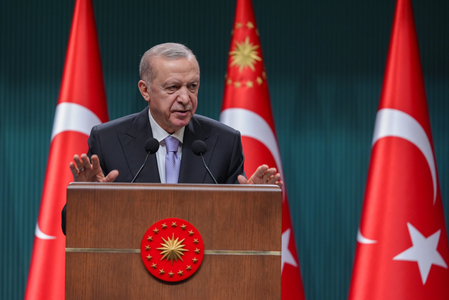
New Delhi – Turkey’s outspoken support for Pakistan in the aftermath of India’s counter-terror strikes in Pahalgam reveals more than just regional posturing. It underscores President Recep Tayyip Erdogan’s broader strategic ambition to position Turkey as a central voice in the Muslim world — potentially supplanting Saudi Arabia’s traditional leadership — while expanding Ankara’s influence across South and Southeast Asia.
This ambition became particularly evident in 2019, when Malaysian Prime Minister Mahathir Mohamad hosted a summit focused on the challenges facing the Islamic world. Saudi Arabia boycotted the event and pressured allies, including Pakistan, to withdraw. In contrast, Erdogan embraced the summit, highlighting the ideological divergence between Riyadh and Ankara. The Saudis viewed the gathering as a direct threat to their religious authority and dominance over the Organization of Islamic Cooperation (OIC).
Saudi Arabia has long asserted its leadership in the Islamic world, drawing on its custodianship of Mecca and Medina and its promotion of Wahhabi Islam. However, under Crown Prince Mohammed bin Salman’s reforms—such as loosening religious restrictions, increasing entertainment options, and empowering women—Saudi Arabia has shifted away from exporting religious conservatism. His Vision 2030 plan emphasizes modernization and economic diversification, creating space for other Muslim-majority countries to assert their influence.
Turkey, under President Erdogan and the Justice and Development Party (AKP), has moved decisively to fill that vacuum. Erdogan’s leadership draws on historical legacy, strategic alliances, and ideological conviction to reassert Turkey’s role as a major voice in the Islamic world. This approach, often referred to as "neo-Ottomanism," blends national pride with a pan-Islamic outlook, though Erdogan avoids explicitly framing it as such.
Turkey’s ideological foundation for this role has roots in Cold War-era nationalism. During that time, U.S.-backed programs like Operation Gladio encouraged Turkish Islamic nationalism to counter communism. Alparslan Türke?, founder of the Nationalist Movement Party (MHP), famously proclaimed, “Turkishness is our body, Islam is our soul,” promoting a distinctly Turkish interpretation of Islam that diverged from Arab-centric orthodoxy.
Erdogan has since built upon that legacy, combining calls for Muslim solidarity with strategic actions in conflict zones such as Syria, Libya, the Caucasus, and increasingly, South Asia.
Nowhere is this shift more evident than in Turkey’s deepening relationship with Pakistan. Erdogan remains one of the few world leaders to have addressed Pakistan’s parliament — a symbolic gesture reflecting the countries’ enduring ties.
Turkey and Pakistan’s strategic relationship dates back to the Cold War, when both nations joined Western alliances like CENTO and SEATO. While India pursued non-alignment, Pakistan aligned itself with the U.S., finding a like-minded partner in Turkey. Over time, cultural and ideological ties blossomed, with Turkish Islamists drawing inspiration from Pakistani thinkers like Abul A’la Maududi and Muhammad Iqbal. During the Soviet-Afghan war, Turkish and Pakistani intelligence agencies coordinated covert support for the Mujahideen.
Today, Turkey is the second-largest arms supplier to Pakistan, providing advanced drones such as the Bayraktar TB2 and supporting modernization of the Pakistani military. The two nations also cooperate closely on issues such as Kashmir, Islamophobia, and regional diplomacy, formalized through the High-Level Strategic Cooperation Council. Trade and investment initiatives are expanding, with a mutual goal of reaching $5 billion in bilateral trade.
Their ideological alignment is reinforced through education, religious outreach, and social programs. Turkish NGOs and institutions are active in Pakistan, promoting long-term cultural and religious connections.
This emerging Turkey–Pakistan axis is now extending its reach to Bangladesh. In early 2025, a Turkish delegation visited Dhaka shortly after Pakistan and Bangladesh agreed to conduct joint naval exercises — their first military collaboration since the 1971 war. This marked a symbolic shift, as Pakistani troops operated on Bangladeshi soil for the first time since the country's independence.
Adding to regional concerns is the activity of Turkish-backed NGOs in Bangladesh. Groups like Saltanat-e-Bangla are linked to Ankara’s religious soft power efforts and reportedly promote revisionist visions of a “Greater Bangladesh,” including parts of India and Myanmar. Though fringe, such narratives can gain momentum in politically unstable environments.
For India, which is already wary of China’s regional footprint, Turkey’s growing influence represents a new and complex strategic challenge. Ankara’s outreach is not limited to cultural diplomacy; it reflects a calculated bid to reshape regional alliances and challenge the Gulf powers — particularly Saudi Arabia and the UAE — for religious and political leadership in the Muslim world.
The future of this realignment depends on the responses of key regional actors — including India, Iran, Saudi Arabia, and China. But the trend is unmistakable: Turkey is no longer a peripheral player in South Asia’s Muslim politics. It is actively reshaping alliances and asserting itself as a central force in the Islamic world.
With inputs from IANS